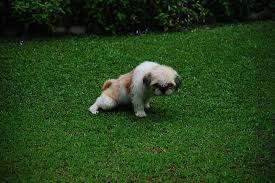
When you stop to consider some of the disgusting things your dog or puppy is willing to roll in, or put in their mouth, it makes it a little bit hard to believe that they are picky and specific about where to relieve themselves. Dogs will go to great lengths to avoid soiling near where they eat and/or sleep. This means that any accidents an un-housebroken dog has will be far from its eating area and bed. To a dog, however, "far" can mean about 6-10 feet. This can leave lots of space in your home, unless you guide the dog to suitable spots(outdoors).
Whether your dog is a puppy, or an adult dog new to your home, the process to follow is the same:
- Every couple of hours, take your dog outside to a place you designate as a "bathroom" area.
- 30 minutes after the dog or puppy eats, do the same.
- Stay in this bathroom area, and praise the dog when they relieve themselves.
- If the dog doesn't use the bathroom when you've taken them outside to the appropriate spot, try again in 15 minutes. Continue doing this until they've actually used the bathroom spot.
- When your dog is inside, watch him closely for any signs of needing to "go". A dog will normally circle and sniff areas when they're about to relieve themselves.
How quickly your dog becomes housebroken depends partially on their personality, but the majority of the responsibility will rely on your diligence in taking them outside at the correct time. If your puppy is less than five months old, you should plan on getting up during the night to take it outside. Puppies over five months of age can usually "hold it" through the night, but if your dog cries to be let out, it is best to get up and let them tend to the urge. It is vital that you give your dog every chance to succeed during this time. Positive reinforcement of the proper behavior is the fastest way to teach your dog anything.
It is important to remember that accidents happen, and when they do, your response will directly affect how quickly your dog learns to "go" outside. If you catch your dog in mid-squat, clap your hands or call their name loudly to distract them. Once you have their attention, quietly and calmly take them outside. Be sure to praise your dog or puppy well when they finish relieving themselves outside properly.
If you find a wet spot or droppings on the floor, simply clean it up. If your dog approaches to investigate what you are doing, ignore them. Don't talk to or pet the dog at this moment, because it could be interpreted as praise. Above all else, avoid yelling or physically punishing the dog, because they won't make the connection between their mess, and your anger.




